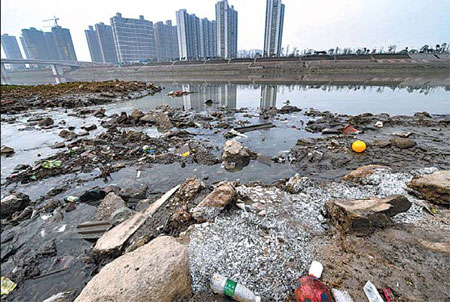Environment will be hot topic at sessions
|
Waste clogs a polluted river in Changsha, Hunan province, on Sunday. Nearby factories have been discharging polluted water into the Yangjiawan section of the Liuyang River since the end of 2012. Long Hongtao / Xinhua |
Pollution of water, air gets 'unprecedented' attention at major meetings
Environmental issues will be main discussion points at the upcoming two sessions, say deputies who are busy preparing proposals.
"This year's two sessions may value the importance of environmental issues at an unprecedented level," said Zhao Jindong, a biology expert and academic with the Chinese Academy of Sciences.
"I am working on a proposal about water resources protection in the Yangtze River, and the country's two largest freshwater lakes: Poyang Lake and Dongting Lake," said Zhao, a member of the National Committee of the Chinese People's Political Consultative Conference.
Soil pollution is the topic Wang Mingwen has been preparing for the coming two sessions.
"With the heated topic of airborne pollution and the recent groundwater pollution, the Environmental Protection Ministry must be under great pressure this year," said Wang, a law expert from Sichuan province and a member of the National People's Congress.
Environmental issues have attracted the most public attention, starting with PM2.5 - particulate matter smaller than 2.5 microns that can enter people's lungs and bloodstream.
"China has entered the era of 'three Ps': GDP, CPI and PM2.5," Environment Minister Zhou Shengxian said at a national-level environmental conference in January.
For the first time, PM2.5, a key indicator of environmental quality, was mentioned by an official in the same breath as GDP - gross domestic product, which illustrates economic development, and CPI, the consumer price index that shows the price level.
"The public is demanding improvement in environmental quality just as much as they are asking for a stable price level," said Zhou.
Unlike other forms of pollution, airborne pollution can affect a larger group of people regardless of their income and social status.
Large areas of the country have been shrouded in smog and haze four times in January, reaching more than 1.4 million square meters.
In some regions, pollution has hit record levels, for example, climbing higher than 900 micrograms per cubic meter in the capital, the highest level recorded since Beijing began publishing the data in early 2012.
Since then, residents in Beijing are aware of the fact that airborne pollution will be unavoidable as long as there is no strong wind.
Face masks sold out in the city, and the price of air purifiers continues to rise. Sales of polluting fireworks during the Spring Festival were down 35 percent from last year.
As the public finds its own way to combat airborne pollution, more people are placing their hopes on the government's measures.
One possible cure is the Atmospheric Pollution Prevention Act, which is under revision.
The draft was handed to the State Council three years ago, but is still not on this year's list of planned legislation.
"Many experts, including me, have been calling to accelerate the legislation process of this law, hoping to see it on next year's list," Chai Fahe, vice-president of the Chinese Research Academy of Environmental Sciences, who has participated in writing the draft, told China Daily.
As the public's attention was fixed on airborne pollution, environmental experts warned that the country's environmental problems have entered all dimensions: air, surface water, groundwater and farmland soil.
On Feb 11, allegations that Shandong province enterprises pump polluted water some 1,000 meters deep into the ground appeared on the Internet, prompting attention from the media and local environmental departments.
After an investigation that lasted for about 10 days, such cases have still not been revealed.
But the country's groundwater pollution situation is still worrying. Media reported that groundwater quality in 55 percent of 200 cities was badly polluted, quoting an investigation by the Ministry of Land and Resource in 2011.
Experts said that pollution in farmland soil is no better than the water and air. Figures from the 1990s by the Environmental Protection Ministry showed that more than one-tenth of the country's arable land was polluted. But experts said the current situation has certainly worsened from two decades ago.
The two ministries started an investigation of the country's soil pollution in 2006, but the results have not yet been released.
Another worrying sign is the continuous growth of protests triggered by environmental issues, about 29 percent per year since 1996, Yang Zhaofei, vice-chair of the Chinese Society for Environmental Sciences, revealed at a national-level meeting in October 2012.
2012 saw protests in Ningbo, Zhejiang province, Shifang, Sichuan province and Qidong, Jiangsu province, between July and October, all triggered by worries about local projects that may pose environmental risks to the community, whether the projects passed official tests or not.
All three cases ended up with local governments promising to cancel the projects forever.
Gao Jixi, director of the ecology institute of the Chinese Research Academy of Environmental Sciences, told China Daily that he is working on a proposal on how to solve the contradiction between development and the environment.
"This year's two sessions may address environmental issues from all aspects, such as what industries and consumers can contribute, rather than simply focusing on the duties of environmental protection departments," said the member of the Chinese People's Political Consultative Conference.
Contact the writer at wuwencong@chinadaily.com.cn

























